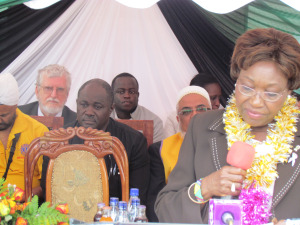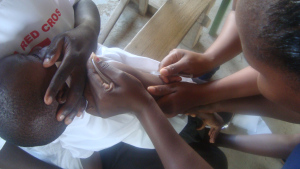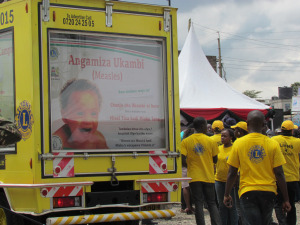Text by Zorodzai Machekanyanga, WHO
Kenya conducted its nationwide measles Supplemental Immunisation Activities (SIAs) successfully from 3 to 7 November 2012, and vaccinated nearly 6 million children aged 9 to 59 months, reporting 99% coverage. In addition to measles vaccine, all targeted children were given supplemental doses of Vitamin A. Oral polio vaccine was also provided to all children less than five years of age in 32 high risk districts bordering Somalia, in the Eastern part of the country.
Over 2000 measles cases were reported in almost every district and about 60 measles deaths were reported throughout Kenya since December 2011. The follow-up measles SIAs is a periodic activity, conducted every three to four years, in an effort to address the immunity gap created due to the low routine immunization coverage. In Kenya, it had resulted in the accumulation of large numbers of unvaccinated children and was contributing significantly to the recent measles outbreaks.
 The five day vaccination campaign was launched by the Minister of Public Health and Sanitation, Hon. Beth Mugo who expressed her concern about the resurgence of measles in Kenya. She called on the population to ensure their children were vaccinated against measles as it is among the world’s most contagious diseases. Measles can cause severe complications such as pneumonia, diarrhoea and encephalitis, among others, and death.
The five day vaccination campaign was launched by the Minister of Public Health and Sanitation, Hon. Beth Mugo who expressed her concern about the resurgence of measles in Kenya. She called on the population to ensure their children were vaccinated against measles as it is among the world’s most contagious diseases. Measles can cause severe complications such as pneumonia, diarrhoea and encephalitis, among others, and death.
The heavy rains in most parts of the country during the first two days of the campaign posed a challenge,making it difficult for parents to bring their children to immunization centres. However, the health workers in all districts responded by reviewing their communication and social mobilisation strategies as well as transforming fixed post vaccination service delivery teams into mobile teams to reach more children with the campaign doses. The change in strategy led to an increased demand for the interventions evidenced by a marked increase in number of children vaccinated in the subsequent days.
“The campaign was a success because of the commitment of the Kenyan health workers and all partners who worked tirelessly to ensure all eligible children were reached with the lifesaving vaccine,” said World Health Organization Representative to Kenya, Dr Custodia Mandlhate, in an interview at the end of the campaign.
 Innovative strategies to reach the hard to reach
Innovative strategies to reach the hard to reach
Health workers in the Kamukunji district of Nairobi, which is home to a large Somali migrant community, translated all IEC materials into Somali language, and recruited mobilizers from within the community. In addition, they took the vaccination activity to the private clinics to capture some subsections of the migrant population as well as those reluctant to use government public health service facilities.
In the slum residential area of Kiambiu in the same district, community health workers rounded up unimmunized eligible children whose parents had gone for work and provided them with the vaccines. This was instrumental in reaching children in the slums who are left by themselves during the day.
The national Advocacy and Social Mobilization Committee for Immunization identified the areas where negative religious or political beliefs contributed to immunisation refusals. The committee conducted dialogues with their leaders, who were quite instrumental in encouraging their followers to take their children for measles immunization.
“We identified all the potential negative forces that would affect the measles campaign and engaged their leaders to have a buy-in into the exercise and we had fewer cases of resistance to the measles vaccination campaign,” said Samson Thuo, Communications Officer in the Kenyan Ministry of Health.
Lions Clubs of Kenya plays major role in fight against measles
 The Lions Clubs of Kenya were an important partner in the campaign against measles particularly in the area of social mobilization. They sponsored road shows that criss-crossed the country spreading key messages on the measles campaign using a public address system. In addition, the Lions also supported communication and social mobilization activities geared towards strengthening the demand for routine immunisation services.
The Lions Clubs of Kenya were an important partner in the campaign against measles particularly in the area of social mobilization. They sponsored road shows that criss-crossed the country spreading key messages on the measles campaign using a public address system. In addition, the Lions also supported communication and social mobilization activities geared towards strengthening the demand for routine immunisation services.
The involvement of the Lions Clubs of Kenya was also instrumental in reaching the urban elites. The Principal of Shree Cutchi Leva Patel Samaj School in Nairobi West, Mr Harbhajan Gill, who is also the Lions Club President, said that the club had held meetings with its community members on the measles campaign and they had responded positively by allowing their children to be vaccinated at the school.
“Parents were worried about the safety of the measles vaccine and whether it was being utilized in other countries. We brought in experts who explained to them and they all brought their children for immunization. As Lions, it is our responsibility to support government initiatives to protect our children from vaccine preventable diseases,” said Principal Gill.
The integrated measles campaign was led by the Government of Kenya and was supported by the Measles & Rubella Partnership partners.



















 Prelude Version 2.3.2
Prelude Version 2.3.2